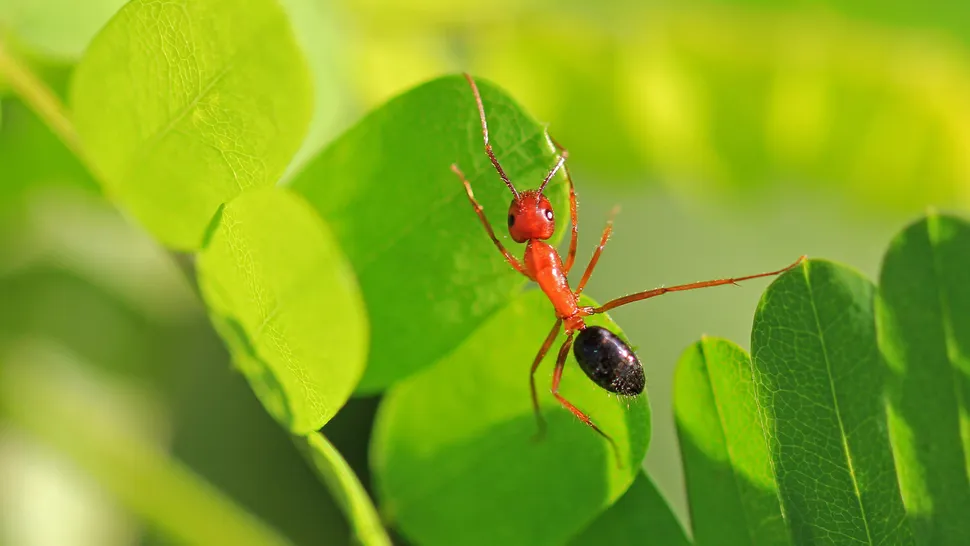Researchers have identified an enzyme within the ant “blood-brain barrier” responsible for regulating whether an ant adopts the role of a soldier or a forager.
Ants’ complex caste system may be partly controlled by the insect version of the blood-brain barrier, a gatekeeper that only lets certain substances into the brain, a new study reveals.
An anthill is a meticulously organized community of insects, with clear divisions of labor to ensure smooth operation. While the queen lays eggs, worker ants either forage for food or protect the nest as soldiers, and the ants’ hormones, including one called “juvenile hormone,” dictate which role each ant plays.
However, the underlying molecular controls that regulate these hormones to shape social behavior have not been well understood.
Now, a recent study has shown that the blood-brain barrier (BBB), the filter that protects the brain from unneeded or potentially harmful substances, plays a role in this process. The findings, published Sept. 7 in the journal Cell, indicate that the ant BBB regulates hormone levels entering the brain, thus influencing worker ants’ roles in the colony.
In the study, researchers set out to understand the basis of the behavioral differences between forager and soldier ants. They investigated which genes and proteins were expressed differently among these two classes of worker Florida carpenter ants (Camponotus floridanus). They discovered that an enzyme that breaks down juvenile hormone, called juvenile hormone esterase, was present only in the cells that make up the ants’ BBBs.

The study’s analysis unveiled that soldier ants exhibited elevated levels of juvenile hormone esterase compared to foragers, resulting in a reduced influx of the hormone into the soldiers’ brains.
In a groundbreaking experiment, researchers injected juvenile hormone directly into the brains of soldier ants, sidestepping the blood-brain barrier (BBB). Remarkably, the ants promptly abandoned their mercenary roles and transitioned to seeking food. A parallel shift in social behavior occurred when the researchers manipulated the gene responsible for producing juvenile hormone esterase, reducing its supply. Without the enzyme to break it down, juvenile hormone reached the ants’ brains, prompting a significant reprogramming of their behavior.
Previous studies had hinted at the BBB’s potential regulation of hormone levels in insect brains, as noted by Karl Glastad, a researcher at the University of Pennsylvania, and co-first author of the study. However, the dynamic regulation of juvenile hormone by the ant blood-brain barrier, influencing crucial behaviors, proved to be a surprising revelation.
Daniel Kronauer, an evolutionary biologist at The Rockefeller University not involved in the study, expressed enthusiasm about the tight regulation of juvenile hormone access to the brain by the blood-brain barrier, deeming it a “really cool finding.”
To investigate the enzyme’s impact on a less socially complex insect, the research team conducted experiments with fruit flies (Drosophila melanogaster). Activating the gene for juvenile hormone esterase in the fly BBB triggered behavioral changes akin to those observed in ants. Genetically modified flies spent less time searching for food than their unmodified counterparts.
Unraveling the factors governing the levels of juvenile hormone esterase in an ant’s BBB remains a subject for further exploration, according to Glastad. However, these findings underscore the blood-brain barrier’s active role in insects, challenging the notion of it as a passive sieve and highlighting its involvement as a vital component in an entire behavioral circuit.
In their quest to determine whether similar mechanisms exist in other animals, the researchers analyzed data from other labs and identified hormone-degrading enzymes in the cells of the mouse BBB. While cautioning about extending findings from insects to mammals, Kronauer acknowledged the possibility of analogous systems in the mammalian BBB regulating hormone levels through molecular breakdown, emphasizing the need for additional experimental work to confirm this hypothesis.
